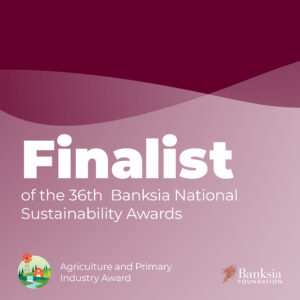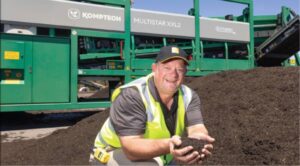C-Wise’s Andy Gulliver, QMulching’s Neil Horne and Councillor Robert Garland with first pile of recycled organics
The Wide Bay Water Board, which services Queensland’s Fraser Coast Region including Hervey Bay and Maryborough, is acknowledged nationally as a leader in community based recycling systems. In the 1990’s they commenced recycling waste water from their treatment plant by selling water to local farmers for beneficial use on commercial crops including turf and sugar cane. A 400 hectare (and growing) hardwood plantation has been planted to use any of the treated recycled water, not taken up by commercial growers.
The accepted practise at that time would have seen an outfall pipe discharging the nutrient rich water into the ocean in the sensitive Great Sandy Strait which runs alongside the world’s largest sand island, World Heritage listed – Fraser Island. So instead of adding to nutrient pollution in the ocean, the treated water is used on land to help grow income producing plants – thats a real win for the environment.
The Corporation also owns and operates the WetSide Water Education Park where locals and tourists can enjoy water activities including surfing, free of charge. Water conservation messages are subtly woven into the fabric of the park and recycled storm water is treated onsite to supply the parks many fountains.
With this background it comes as no surprise to learn that the Corporation has initiated a trial to recycle treated biosolids from the waste water treatment plant in a safe and a sustainable way. The trial is being managed by QMulching at Hervey Bay with support from C-Wise, a Mandurah based specialist composting company.
QMulching have a long working relationship with the Fraser Coast Regional Council who own the Water Corporation. The council takes greenwaste from householders that they deliver to the council recycling centres at no charge. This greenwaste material is shredded by QMulching and then composted using the MAF Composting System. ‘MAF” stands for Mobile Aerated Floor and this system gives QMulching great control over the composting process. QMulching have been using this system for some time to recycle community greenwaste into a range of popular soil conditioners and mulches.
The MAF units send pulses of air through a large block-like stack of composting material to keep the composting microbes working at a high level. The controlled temperatures assure pasteurisation of the ingredients and give precise control over the composting process. The MAF system is much more space efficient than traditional windrow systems and not only reduce greenhouse gas emissions from the composting process but also cuts odour emissions dramatically.
Biosolids sometimes go to landfill or have to be stored for long periods of time before re-use. This creates costs in storage, environmental risks in run off and the potential to create greenhouse gases. Using unstabilised biosolids directly onto land is currently allowed but may not be acceptable in the future. Composting the biosolids converts the carbon into a stabilized form which is much better for the soil and the environment.
The goal of the trial is to demonstrate how biosolids can be safely and effectively treated by composting to be a valuable soil improver and mulch then recycled back into farming and community gardens. Composted products will help local farmers build healthy soils and more resilient food productions systems. There are also opportunities to use composted products to improve parks and gardens in the Fraser Coast Council area.
Andy Gulliver, from C-Wise visited the facility to assist with the first turn of the MAF heap. Turning occurs every fortnight during the 8-10 week process. With 30 years’ experience in composting, Andy is able to help set up management protocols and finesse the process to ensure that the resulting products are of a high quality and the production system is safe and successful. He spoke to councillors from the Fraser Coast Regional Council and was interviewed by local radio and TV stations. There was a good deal of enthusiasm for the concept of local recycling of organic resources for use back in the same community. In other words closing the recycling loop.







